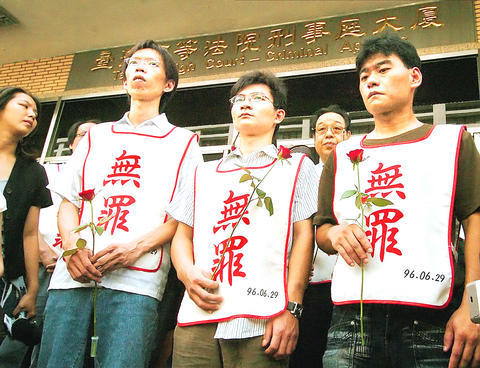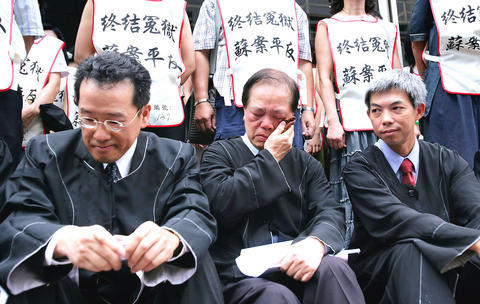Dramatically reversing its 2003 acquittal of three men known as the "Hsichih Trio," the Taiwan High Court yesterday sentenced them to death.
Supporters and human-rights protesters derided the judicial system outside the court after the verdict was delivered.
"The judicial system is guilty; the defendants are not," protesters shouted outside the court building.

Su Chien-ho (蘇建和), Liu Bing-lang (劉秉郎) and Chuang Lin-hsun (莊林勳) had been convicted in 1991 of the murders of Wu Ming-han (吳銘漢) and his wife, Yeh Ying-lan (葉盈蘭), whose bodies had been found at their home in Hsichih, Taipei County, with more than 77 stab wounds.
After remaining on death row for more than 11 years, the trio were freed in 2003 when the Taiwan High Court overturned their sentences. But later the same year the Supreme Court ruled that the High Court should re-examine the case.
The Taiwan High Court yesterday morning handed down its verdict, reinstating the death sentences.

"Su Chien-ho, Liu Bing-lang and Chuang Lin-hsun committed murder and robbery. The court sentences the trio to death," presiding judge Kuan Yu-ming (
Chuang had an emotional outburst in the courtroom, while Su and Liu started crying after the verdict was read.
Su's and Liu's mothers also broke down in court.
"I have been wronged for 16 years. I did not kill anyone. I insist on an appeal," Su told reporters outside the court.
"The ruling is ridiculous. The judicial system is stained. Judicial reform is bullshit," defense lawyer Su You-chen (
Su and several other defense lawyers wore their robes inside out in protest at the ruling in a brief sit-in outside the court.
The court yesterday did not order the trio detained.
"It is usual practice for courts to detain defendants when they have been given severe sentences such as the death penalty or life imprisonment," said Taiwan High Court Prosecutor Chen Yu-chen (
Taiwan High Court spokesman Wen Yao-yuan (
Wang, a marine at the time of the murders and whose fingerprints were found at the scene of the crime, was executed on Jan. 11, 1992, under Military Law (
Wen said yesterday the court had accepted a domestic forensic report that found that marks on the two victims' skulls had been inflicted by three different knives, and that more than one person had been involved.
The court dismissed the opinions of US forensic expert Henry Lee (
"It is possible that the murder was committed by a single person," Lee told the court.
Chinese Nationalist Party (KMT) presidential candidate Ma Ying-jeou (馬英九) yesterday expressed surprise at the ruling.
Ma, a former justice minister, refused to sign the trio's execution order during his term and sent the case back to the Supreme Court in hope of a retrial.
Ma said he had refused to sign the order owing to a lack of evidence, and never regretted his decision.
After learning of the verdict, two Democratic Progressive Party (DPP) legislators threw their support behind the trio.
amnesty?
DPP Legislator Gao Jyh-peng (
Calling the procedure used by prosecutors to collect evidence in the case "flawed," Gao said that if the president granted the trio clemency, prosecutors would pay more attention to procedural justice in the future.
"The law punishes someone to prevent them from committing another offense. I think this purpose has been served," DPP caucus whip Wang Tuoh (王拓) said.
Wang said he supported the idea of granting a pardon, adding that he may suggest it to other caucus members.
DPP Legislator Tsai Chi-fang (
Although the trio deserve sympathy, the president should not grant amnesty lightly, he said.
divided
Pan-blue lawmakers were divided over a suggestion by Gao that the president should grant a special pardon to Su Chien-ho.
KMT Legislator Joanna Lei (
"As far as I understand it, both the direct evidence and the circumstantial evidence were too weak to prove Su Chien-ho's guilt," Lei said.
"On the principle of presumption of innocence, anyone should be pronounced innocent under such circumstances," Lei added.
Lei said she was in favor of Gao's suggestion, while People First Party Legislator Lee Hung-chun (李鴻鈞) remained cautious.
Lee said that not every controversial case could be resolved by an amnesty, adding that those who made such a suggestion should explain their rationale.
Additional reporting by Flora Wang, Shih Hsiu-chuan and Mo Yan-chih

The paramount chief of a volcanic island in Vanuatu yesterday said that he was “very impressed” by a UN court’s declaration that countries must tackle climate change. Vanuatu spearheaded the legal case at the International Court of Justice in The Hague, Netherlands, which on Wednesday ruled that countries have a duty to protect against the threat of a warming planet. “I’m very impressed,” George Bumseng, the top chief of the Pacific archipelago’s island of Ambrym, told reporters in the capital, Port Vila. “We have been waiting for this decision for a long time because we have been victims of this climate change for

Rainfall is expected to become more widespread and persistent across central and southern Taiwan over the next few days, with the effects of the weather patterns becoming most prominent between last night and tomorrow, the Central Weather Administration (CWA) said yesterday. Independent meteorologist Daniel Wu (吳德榮) said that based on the latest forecast models of the combination of a low-pressure system and southwesterly winds, rainfall and flooding are expected to continue in central and southern Taiwan from today to Sunday. The CWA also warned of flash floods, thunder and lightning, and strong gusts in these areas, as well as landslides and fallen

MASSIVE LOSS: If the next recall votes also fail, it would signal that the administration of President William Lai would continue to face strong resistance within the legislature The results of recall votes yesterday dealt a blow to the Democratic Progressive Party’s (DPP) efforts to overturn the opposition-controlled legislature, as all 24 Chinese Nationalist Party (KMT) lawmakers survived the recall bids. Backed by President William Lai’s (賴清德) DPP, civic groups led the recall drive, seeking to remove 31 out of 39 KMT lawmakers from the 113-seat legislature, in which the KMT and the Taiwan People’s Party (TPP) together hold a majority with 62 seats, while the DPP holds 51 seats. The scale of the recall elections was unprecedented, with another seven KMT lawmakers facing similar votes on Aug. 23. For a

All 24 lawmakers of the main opposition Chinese Nationalists Party (KMT) on Saturday survived historical nationwide recall elections, ensuring that the KMT along with Taiwan People’s Party (TPP) lawmakers will maintain opposition control of the legislature. Recall votes against all 24 KMT lawmakers as well as Hsinchu Mayor Ann Kao (高虹安) and KMT legislative caucus whip Fu Kun-chi (傅崐萁) failed to pass, according to Central Election Commission (CEC) figures. In only six of the 24 recall votes did the ballots cast in favor of the recall even meet the threshold of 25 percent of eligible voters needed for the recall to pass,